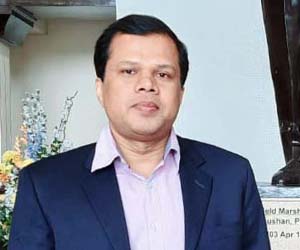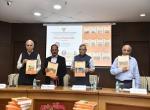On 20 July 2023, the Vivekananda International Foundation (VIF) organized an interaction with the visiting US-India Strategic Partnership Forum (USISPF) delegation, which was led by President and CEO, Dr Mukesh Aghi. The interaction covered a wide range of bilateral issues, especially focused on the recent developments in the areas of critical and emerging technologies under the India-US Initiative on Critical and Emerging Technologies (iCET) framework. The participants deliberated on pertinent issues, including semiconductor, space, defence technology, global tech race, China threat, India’s role in managing China threat, de-risking, nurturing young STEM talents, and role of Indian-Americans. They discussed the emerging opportunities and prevailing challenges for forging a strong strategic technology partnership between the two countries. Director, VIF, Dr Arvind Gupta chaired the interaction and made the opening and concluding remarks.
At the outset, it was noted that Prime Minister Narendra Modi’s recent state visit to the US took the India-US strategic partnership to a new height. During the PM’s visit, the two sides identified a number of areas for potential cooperation, starting from space to defence, artificial intelligence (AI) to quantum technologies (QT), and vaccine development to clean energy technology among others to move forward the partnership. They also added several new dimensions to the growing partnership, including the joint development of Jet Engines for the Indian fighter aircrafts. The two sides are currently categorizing these areas into different groups and defining the criteria for success of these areas, and timelines for execution. It was noted that implementing the agreed areas of cooperation will have significant implications at bilateral, regional and global levels. It was also noted that following the state visit to the US, Prime Minister Modi had a successful visit to France and then to the United Arab Emirate (UAE). India is currently hosting G20 sectoral meetings and in September it will host G20 leaders meeting, where PM Modi and President Biden are expected to meet, and also at the Asia Pacific summit.
The participants discussed the iCET mechanism; and hoped that it will work and take the strategic partnership to the next level. For realising the set goals under the iCET framework, government-to-government cooperation and support is very important. Incidentally, the Indian government has come up with a policy of getting some support from foreign governments, including from the US. In some basic S&T research areas, India expects support from countries like the US to take the research forward. But there are apprehensions that the Indian government is not getting sufficient support and facing bureaucratic challenges. The participants discussed the importance of overcoming those bureaucratic challenges and hindrances to get those approvals done for developing bilateral cooperation. It was emphasised that India wants to collaborate in more capacity and capability building in S&T field.
It was noted that semiconductors have become crux of the most of the technologies. It is the critical aspect of any manufacturing industries with having commercial aspects into it. The US has realised that India is a big market for semiconductors and electronic goods. However, it was pointed out that over the years, the US has lost the semiconductor manufacturing to Taiwan Semiconductor Manufacturing Company (TSMC). For assembly, packaging, testing parts of the global supply chains, the US went to China, but with the rise of competition and rivalry between the US and China, the de-risking is taking place. Now, a lot of strategic thinking is taking place, where countries like India are seen as alternative to China. The two sides explored the emerging opportunities for space cooperation, including space debris management, quantum computing, cryptography, writing codes, which are of software driven, AI and among others. They also discussed defence technology cooperation and the prevailing skepticism with regard to the joint R&D and production of defence technologies, transfer of technology and IP rights. In these sectors, the startups can play important role, which need to be picked up early on and necessary support should be provided to realise their true potential. Their success will create positive momentum.
Importantly, the world is changing rapidly and it is under tremendous geopolitical turbulence. Meanwhile, China under President Xi Jinping’s leadership has built its military capabilities, both in terms of quantity and quality, which has led to the People’s Liberation Army (PLA)’s assertive behaviour in the Indo-Pacific region. Amidst growing geostrategic and technological competition between the US and China, Washington and its allies see China as a key concern and long-tern challenge. India shares some of these concerns with regard to China, but at the same time, it is ‘the most important deterrence against China’. India has become pivotal in the US’ China strategy. It was underlined that India’s military and strategic concerns vis-à-vis China also must be taken into board. It was observed that while the world is not going to settle down so easily soon. A strong India-US strategic partnership offers peace, stability and prosperity to the people of the two countries as well as to the world at large. Currently, all the factors are basically aligned with India and it is in a ‘geopolitical sweet spot’.
It was noted that the US is going to presidential elections process very soon. So the political sentiment will be focussed on winning elections rather than on the bilateral issues. India is also going to general elections next year. Evidently, the political leadership in both sides is likely to focus on getting reelected. The onus is on other stakeholders, including private companies, startups, think tanks and academia to forge strong collaboration to constantly drive the partnership forward. It was observed that the US has got two segments, one is the government and the other is the private sector. The private sector is easy to move forward and collaborate with on shared issues. But then the bureaucracy comes in, where they have to deal with issues. There are certain forces in the US bureaucracy, who will not want or support technology transfer to India. It was emphasized that developing mutual trust and transparency is very important for further strengthening the strategic partnership, especially in the field of advanced technologies. In this regard, the two sides need to talk regularly not just at the policy level, but also at the Business-to-Business (B2B) levels through established mechanism.





Post new comment